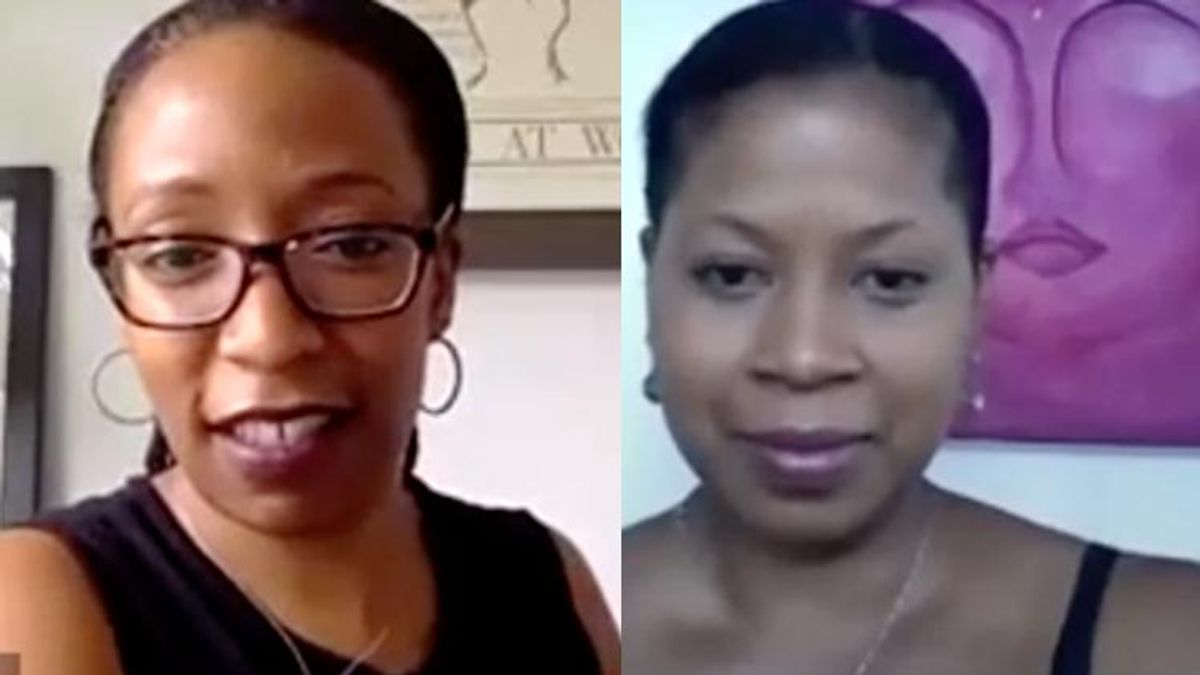In the latest episode of the long-running series Cherry Bomb, shot Sunday morning amid national protests against police brutality visited on Black people, hosts Gloria Bigelow (pictured left), Dalila Ali Rajah (pictured right), Tatum De Roeck, Nikki Caster, and their producer Bethany Landing discuss white privilege and systemic racism that can't be solved by simply "coming together." Meaning that white people must educate themselves and one another in order to be truly anti-racism.
Ali Rajah, an actress and content creator, addresses those white people who've been in her life for some time who've failed at educating themselves about what Black people endure from racist systems daily, even amid outrage over the recent police killings of George Floyd, Breonna Taylor, and Tony McDade (among so many who came before).
Spurred by a white friend who defended her position of decrying the looting that has occurred over the past several days because she said she was a queer woman and understood marginalization and refused to back down from defending that myopic position, Ali Rajah explains that its not the job of any Black person to educate.
"At this point, you have the internet, you have all kinds of other white people writing things to help people understand. There are 20 million think pieces. There are books. There are literally resource lists after resource list," Ali Rajah says.
"If you're ignorant right now, it's because you didn't look for a resource to learn something," she adds. "You have the option to read the same things and to learn the things, not to ask me how to do it. Fucking look it up."
"You don't need to be writing a diatribe about why you are also oppressed to explain why you understand what it feels like to be oppressed for centuries. And in that same breath tell me, 'And you shouldn't protest it this way or grieve it this way,'" she adds.
"People can't just not be racist. They have to be anti-racism. White privilege systemically gives you so much more access to so many things," she says. "The way we move forward is that white people step up and talk to other white people and focus on anti-racism."
Later, Ali Rajah breaks down how those white friends she's known who are failing to listen and stand up have created an environment that doesn't feel safe.
"I love my white friends. But if they're not being allies and showing up in the way some of my allies are showing up, even though I've known them so long and loved them and felt safe with them, they're saying things that are hurtful and painful right now that make me feel unsafe about being as close to them," Ali Rajah says.
"I never know who's going to be like that. I never know until it doesn't feel safe to just come together. You can't just expect people who have been through a system like this to just unite with people who have created so much pain. There has to be a pathway of repair."
Early in the discussion, Bigelow, a stand-up comic, references the book So You Want to Talk About Race by Ijeoma Oluo, an essential resource to tackle issues of privilege.
Later, when the conversation turns toward police brutality, Bigelow shares some of the history of policing in the country.
"If you think about where policing in our country came from, it came from the institution of slavery. You go all the way back and look at what it was meant to be originally, which was to protect white folks but also to enforce slavery, to bring slaves back to their masters and things like that," Bigelow says. "If you look at what the original program for policing was in our country, not so great."
Bigelow then shares that at one (brief) point she considered becoming a police officer, explaining that the makeup of a force makes a difference.
"We have seen that when you police in the communities where you live, you police differently," she says.
Read up on resources on how to work toward anti-racism and watch Cherry Bomb below.



















































































